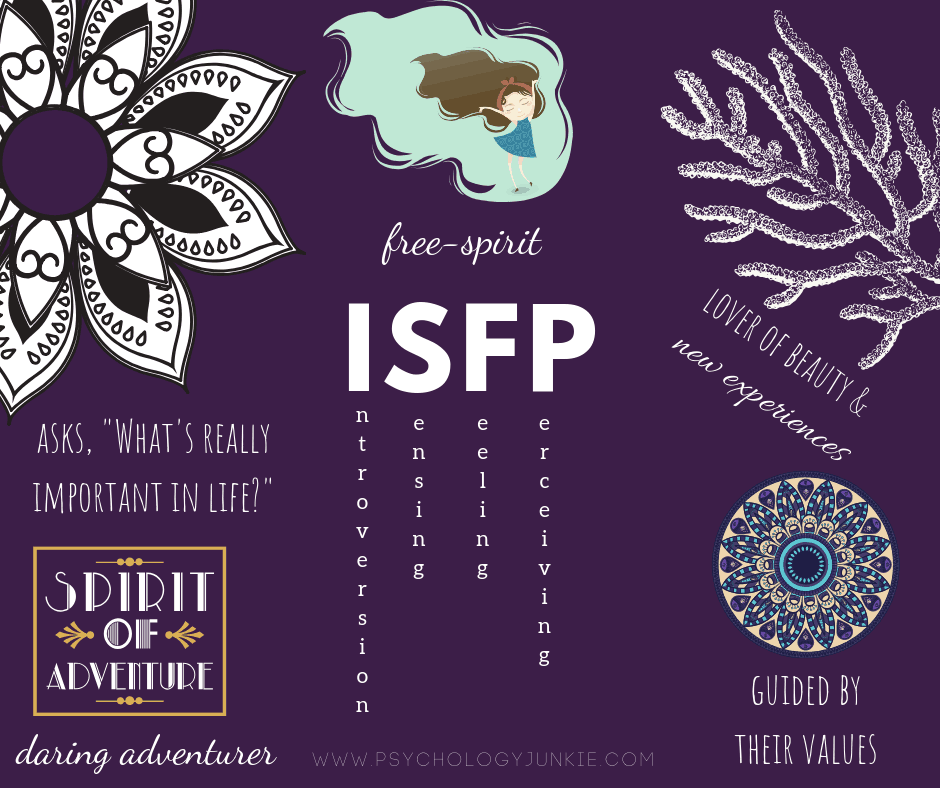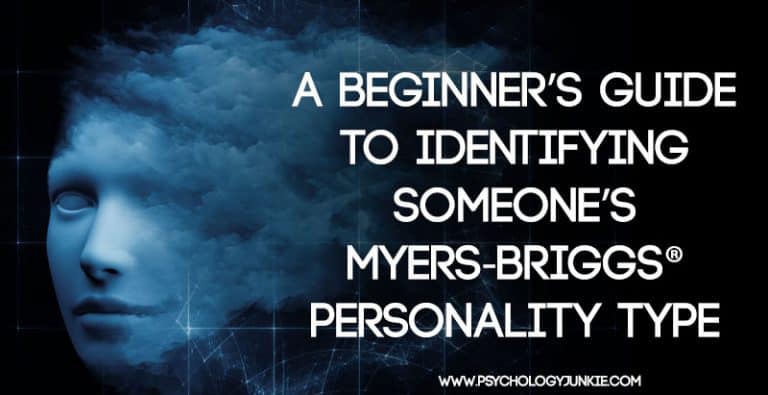What it Means to be an ISFP Personality Type
What does it mean to be an ISFP? Are ISFPs all “artists” or are they all “adventurers?” So many stereotypes about ISFPs abound online, with many painting very one-dimensional portraits. Today I want to dive into what it really MEANS to be an ISFP, and how the cognitive wiring of this type can show up in many diverse ways.
Let’s start with the basics:

What Are ISFPs All About?
ISFPs approach life with a desire to understand their purpose, meaning, and truest convictions. They strive for a life that is rich with beauty and lush experiences. Explorers at heart, ISFPs often wish to travel and see unexplored regions of the world or create something unusual artistically. For some ISFPs these creations revolve around music, for others they revolve around fashion design, and still others use gardening or baking as their creative avenues.
ISFPs are often the composers, activists, and vigilantes of the world. They don’t care what society says is “right” or “good,” they have to figure it out for themselves through long periods of reflection, analysis, and introspection. These types deeply examine events, situations, and people to decide what is right for them, and what falls in line with their mission in life. They are often uncannily insightful into the motivations of others, which can cause them to be distrustful if over time they’ve been hurt.
Not sure what your personality type is? Take our personality questionnaire!
ISFP Championing
Another hallmark of this type is that they believe in standing up for the marginalized and persecuted people of the world. In fact, they often pursue careers that allow them to help others in a hands-on way (careers like health care, firefighting, or law enforcement). ISFPs may seem stoic and hard-to-read at first, but underneath their enigmatic demeanor, they are filled to the brim with unwavering convictions, intense passions, and a determination to live with integrity.
- Driving Force. To live a life in alignment with their values and ethics. To stand up for a cause that they believe in. To maintain inner harmony and integrity with one’s self.
- Backup Strength. Awareness of the world around them and how to use their surroundings to achieve their aims. Highly realistic, observant, adaptable, and attentive to what’s happening around them.
- Weaknesses: May be disorganized and have difficulty maintaining structure and efficiency. They can struggle to be objective and logically consistent in decisions.
- Stressors: Lack of alone time, conflict situations, rigid rules and schedules, unstable relationships, being forced to fake an emotion or mood, feeling cooped up, dealing with impractical people.
The Meaning of the ISFP Four-Letter Code (in brief)
I = Introversion. ISFPs focus inwards before responding to the outside world. They gain energy from alone time when they can reflect on their own thoughts.
S = Sensing. ISFPs prefer to focus on what is real and current. They prefer to talk about experiences and focus on what exists and how to maximize that. They are more aware of current realities than abstract possibilities.
F = Feeling. ISFPs apply personal values and ethics to their decisions. They want to live in congruence with their moral code and they consider the emotional impact a decision will have on themselves and others.
P = Perceiving. ISFPs like having a lot of options and tend to be adaptable and spontaneous. They like to mix work with play and enjoy an exploratory approach to life.
Rumored Famous ISFPs: Jacqueline Kennedy Onassis, Jonathan Ive, Thich Nhat Hanh, Michael Jackson, Prince, Paul McCartney, Keith Richards, Jimi Hendrix, Kate Bush, David Bowie, Lady Gaga, Trent Reznor, Janelle Monae, Ryan Gosling, Audrey Hepburn, Elizabeth Taylor, Avril Lavigne, Enya, Jonsi, Pharrell Williams, Nina Nesbitt.
ISFP Overview

One of the defining characteristics of the ISFP personality type is their insight into ethics, identity, emotions, and values. ISFPs live their lives constantly weighing the personal worth and integrity of each decision they make. However, this doesn’t mean that they are “goody-goodies” who follow the law to a tee. It means that they spend their lives forming a personal moral code that is subjective to them. They want to know what’s worth living and dying for – what’s true and authentic and meaningful to them. These types are less concerned with rules and societal constructs and more focused on their individual sense of right and wrong. Where they do place their loyalty, it is 100 percent. When they do decide something is right, they believe in it unwaveringly. They trust their personal beliefs with a steadfastness that many fail to notice because they can appear so easy-going and tolerant on the outside.
For many ISFPs it’s difficult for them to spell out what their moral code is, they just know it. They have an instinctive gut feeling of what is right and wrong or how phony or authentic someone is being. Because ISFPs each have their own subjective value system, one ISFP might seem very different from another. One ISFP might stand up for the rights of gun-owners while another might fight against gun-ownership, for example. Many, if not all, ISFPs have very strong feelings about justice and personal freedoms. They dislike structures and institutions that place unnecessary rules or limits on people and force them to conform to rules that limit their creativity and/or individuality.
The Sensing Side of the ISFP:
ISFPs are people of action and experience. They enjoy being engaged with the world around them and being present to the moment that exists before them. They are keenly tuned in to the atmosphere, details, and events surrounding them and know how to use their environment to achieve things. Some ISFPs have a thirst for adventure and a desire to be brave and unflappable. Others have a more “zen” quality; tuning into the details of a trickling stream or the nuances of a sip of coffee. Either way, immersion in the moment in all its detail is key.
During crisis situations, it’s common for ISFPs to appear calm, level-headed, and highly alert. Their down-to-earth nature and awareness of physical details can help them to respond effectively to physical risks and dangers. Instead of getting carried away in hypothetical worst-case scenarios, they stay tuned in to the “now” of a situation. This keeps them grounded, alert, and present.
Although ISFPs are introverts, they may not appear like the dreamy reclusive types that are often associated with the preference. Even though ISFPs are visionary and idealistic, they’re also realists. Sensing-Perceivers as the ultimate realists. They see life for what it is; they see facts and details for what they are. Because of this, they are always trying to add to their list of experiences by getting out and exploring the world around them. They may be the first to jump at the chance to go skydiving or sing at a church event, depending on their interests. They may appear more matter-of-fact and no-nonsense than fanciful or shy. With all of the false stereotypes of introversion out there, these types can seem much more daring or pragmatic than is typical.
In careers, ISFPs prize creativity, originality, and freedom. They want what they’re doing to have an immediate, real-world impact. This is why many of them prefer jobs that allow them to help others or make an impact quickly. Performance, the arts, health-care, teaching – these are all careers that let them alter the world for better in a creative way.
One caveat I do want to bring up is that your personality type can show up differently depending on your enneagram type. For example, an ISFP 4 in the enneagram would be more individualistic, more prone to melancholy, more dreamy and creative. An ISFP 7 might be more excitable, action-oriented, and less fond of introspection and self-analysis. If you’d like to find out more about the enneagram you can do so here.

At Their Best:
At their best, ISFPs live with a strong sense of integrity and vision for their lives. They stand strong for their values, but they are also tolerant of people who disagree with them and are open to seeing many points of view. Pragmatic and grounded, they are aware of details in their environment that can be used to their advantage. They respond quickly to incoming information and tend to have an astute, observant demeanor. INFPs at this level are very aware of the emotional bonds that exist between them and others and tend to be able to “read” the people around them and sense things like authenticity or lack thereof or even inner turmoil that a person might be experiencing. They are typically empathetic, compassionate, and gentle.
At this level, ISFPs have developed an appreciation for their opposite preferences (Intuition, Thinking, and Judging). They get advice from people of opposite types so that they can be more productive and balanced. As they open themselves up to other ways of seeing things they develop stronger problem-solving skills, more insight into abstract possibilities, and a greater ability to structure and organize their plans effectively.
Average ISFPs:
At an average level, ISFPs are down-to-earth, sensitive, caring, and creative. They try to experience many new things so that they can add depth to their understanding of the world and themselves. They tend to be attentive, supportive, and loyal to their loved ones. However, they can be skeptical and distrustful as well and may misjudge others too quickly or find it hard to forgive past mistakes. They also may exude an air of self-righteousness when they encounter people who don’t agree with them on the causes that are important to them. When tough decisions are presented to them they may focus primarily on their own feelings and values rather than what is objective or logical. They may seek out advice from opposite types to balance out their decisions. They are typically interested in personal growth and living an authentic, purposeful life.
Unhealthy ISFPs:
At an unhealthy level, ISFPs become reclusive, resentful, and easily offended. They become so wrapped up in their own personal code of ethics and feelings about what’s right that they develop a “martyr” complex or embrace the role of a misfit misunderstood by society. Although in tune with their environment, they may use it in a forceful way, becoming confrontational or overly-absorbed in momentary thrills at the expense of their future ambitions. During conflict situations, unhealthy ISFPs may state their opinions and then withdraw without giving the other party a chance to present their case. In arguments they tend to appear self-righteous and moralizing, assuming ill-intent where there might not be any to begin with. They may feel like they are the only ones crusading for what is right and trying to be good. Defensive and sensitive, people feel like they have to “walk on eggshells” around them.
Some ISFPs spend the majority of their lives at an average or healthy state, while others fluctuate between the three states depending on their stress-levels and maturity. Every individual’s experience will vary.
Personal Growth Recommendations for ISFPs:
- Make sure that you are getting plenty of alone time throughout the week. Without this, it can be difficult for you to make decisions that are fully aligned with your values and needs. Quiet time for reflection enables you to evaluate your choices in a healthier way.
- Don’t withdraw TOO much. You need alone time, but it’s also important for you to get out into the world and experience new things. Go canoeing, take a hike, spend time with friends, take a class! Adding new experiences to your roster helps you to have more balanced views and broader perspectives.
- Spend time addressing your values. What are five things that you would fight and even die for? What are your non-negotiable ethics?
- Enhance your thinking side by spending bite-sized bits of time working on efficiency. How can you organize your day to better meet your objectives? Is there a morning routine that would help you to be better equipped for the day ahead?
- Pick a goal that you have for yourself and break it down into bite-sized steps. For example, “I want to be a social media influencer” could be changed to, “I will post 3x a day on Instagram. I will take photos before breakfast, during my afternoon break, and after dinner.”
- Before acting on instinct or impulse, take a moment to consider the future implications. How will this course of action likely play out in the foreseeable future? What are the pros and cons of this decision? Does this decision line up with what you want in life? Should you ask someone for advice?
What Are Your Thoughts?
Does this article resonate with you as an ISFP? Do you have any insight or thoughts to share? Let us know in the comments!
Find out more about your personality type in our eBook, Discovering You: Unlocking the Power of Personality Type.

Find Out More About Your Type:
10 Things That Excite the ISFP Personality Type
The Unique Intelligence of ESFPs, ESTPs, ISFPs & ISTPs
10 Things You’ll Relate to if You’re an ISFP
10 Surprising Truths About ISFPs









Loved this article, and I agree about the differences in enneagram type, I always thought I was a infp, having a intense passion for reading and writing. I enjoyed watching documentaries, absorbing information and constantly gaining knowledge. I was always self reflecting, to the point where I became obsessive, about my weaknesses. Then I read about the isfp and discovered the perfectionist tendencies in their personality, I was able to sigh in relief and realise I was normal.???? Knowing I was a isfp, gave me a chance to push myself, in taking action for my goals, in life. Within three years of reading about how I can improve myself, I am now currently in university, studying English language and literature. I have my own car, renovating my house and have found a good partner, have an amazing son. God has blessed me and I am grateful to him. My point is that isfp’s have the ability to achieve their dreams, if they execute, organise their plans and ideas well. They are hardworking, intelligent, courageous, creative, loyal, moral and realistic, all the characteristics needed to take life by its horns.
Well. Not a lot to say. Barely imagined myself in someone else’s mind. It’s all right.
I am definitely an ISFP ?4?. It was like you read my mail. It also helpsed me to understand why as a teacher I loved working with children with behaviour and emotional challenges but resented the conformity and rigid thinking of our educational system and that of many colleagues. They did a great deal of harm to children with exceptional minds and hidden ability due to their lack of understanding and tolerance.
I totally agree with this. Rigidity in modern education and Healthcare kept me from pursuing those fields. Now as a church youth volunteer, I get to teach on subjects of great personal importance. And I took up natural medicine as a hobby. I don’t get paid for either but I’d rather do what I love for free than get paid to stay within rigid guidelines I disagree with.
Wow! I think you have helped me sort out a dilemma. I did the MBTI Test years ago when I was having therapy. Then I came outa an INFP with strong tendencies as an INFJ. However, many years down the track, having read your input on INFP’s, it just didn’t quite fit. This time, in taking your questionnaire, I came out as an ISFP. Now this fits me to a tee!! Thank you SO MUCH Susan. Doing a happy dance…
Wow! I think you have helped me sort out a dilemma. I did the MBTI Test years ago when I was having therapy. Then I came outa an INFP with strong tendencies as an INFJ. However, many years down the track, having read your input on INFP’s, it just didn’t quite fit. This time, in taking your questionnaire, I came out as an ISFP. Now this fits me to a tee!! Thank you SO MUCH Susan. Doing a happy dance…
I have always struggled with a feeling that the ‘real me’ isn’t the person I was raised to be. In my 20s I discovered Myers Briggs and tested as an INTJ. Twenty years later I’ve retested as an ISFP and your summary is basically describing the person I know I really am, which proves that my internal conflict was real. Thanks for this great website!
PS Think there is a typo in the “At their best” paragraph as you mention INFP’s.
I love this……..this is like a guideline..and honestly am shocked by how relevant it is.
The accuracy is a bit frightening! Fits me to the letter.
Hi! after all I think I’ve find my true personality type. Actually I’ve lost myself in my life and then decided to remember my childhood and find most parts of my personality which were lost.
my language is Persian sorry for issues in my writing and grammar.
And thank you very much for guiding and helping me!!! God bless you 😉
Good article! I would vote for Banksy and Laura Ingalls Wilder to be added to the list of notable ISFPs 😁